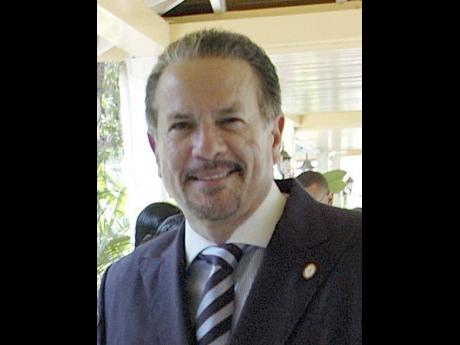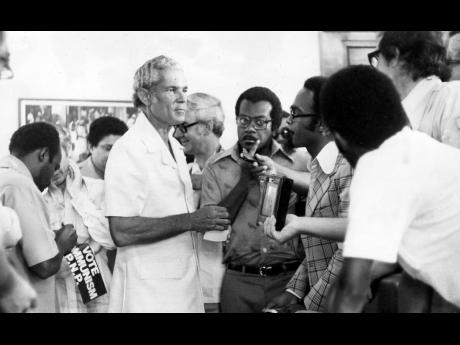Gordon Robinson | No reluctancy to support Tom
My humble apologies to Mikael Phillips. It appears, contrary to my assertions on Tuesday, that the word ‘reluctancy’ does exist in some language texts such as the Free Dictionary (whatever that is) and the Collins English Dictionary published by HarperCollins (an American company based in New York) in Glasgow but not in the Oxford English Dictionary or my thesaurus. So I wuz wrong.
Apparently, ‘reluctancy’ originates in general physics and means “a measure of the resistance of a closed magnetic circuit to a magnetic flux equal to the ratio of the magnetomotive force to the magnetic flux,” but has evolved in at least American English to mean the same as ‘reluctance’. So it’s another one of those modern assaults on the English language by Americans that result in synonyms that sound wrong but are right.
So, again, an unconditional apology to Mikael. I sincerely had never heard or read the word before. This language thingy keeps amazing me, especially how it has been distorted by Americanisms. I suppose if my child can be a baby goat, it’s not unthinkable that my uncooperative attitude to a police investigation can be described as the ratio of magnetomotive force to a magnetic flux. Sigh.
Time to move on! But, speaking of speaking, I was impressed and entertained by the speech given by Senate President Tom Tavares-Finson at the recent joint sitting of Parliament to honour the late Edward Seaga. It was very informative, highly entertaining, and most pointed. In a word, excellent! There has been pushback mainly from PNP insiders because he stepped on some sensitive toes and forced some noses out of joint when he touched on the serious issue of the 1976 state of emergency:
“Today is not the day to highlight the abuses of the state of emergency, which lasted until June 1977 and saw the detention of over 600 persons. Suffice to say, the declaration of the state of emergency is now accepted as being a stain on the national fabric of this country.
“Those who sing Seaga’s encomiums today; those who praise his resilient spirit, his commitment to democracy, and the people of Jamaica, should apologise to the people of Jamaica for the injustices wrought on them by the 1976 state of emergency.
“An apology is owed to the people of this country. An apology is owed to the members of the Jamaica Labour Party, many of whom were detained in Up Park Camp for over a year.”
He also called for personal apologies to be given to “persons whose lives were destroyed by the detention”, including Olivia ‘Babsy’ Grange, Pearnel Charles, and late former MP Ferdinand Yap. They were detained at Up Park Camp during the period of the emergency.
“Offer this apology. Remove this stain from the national fabric of the country. Do this in tribute to Edward Phillip George Seaga!” Tavares-Finson concluded.
I endorse his words, his timing and his intent 100 per cent. Currently, both political tribes are squabbling over whether today’s Petrojam scandal (plus others) renders the current government more corrupt than previous governments that presided over Trafigura, NetServ, Cuban light bulb scandals (and others). But to those of us who were alive, adult, and objective in 1976 KNOW that the greatest act of government abuse ever perpetrated on Jamaican citizens was the declaration of that islandwide state of emergency based on uncorroborated gossip from one unreliable source together with general, vague suspicions.
The security forces did NOT advise that emergency. This was told to the subsequent 1978 commission of enquiry into corruption by Deputy Commissioner of Police Curtis Griffiths, under cross-examination from Abe Dabdoub. Griffiths testified that the PM was advised by a “security committee” that included the police commissioner. Every Jamaican born after 1970 should acquire the transcripts of that commission of enquiry and read them thoroughly.
At the time, the Constitution of Jamaica didn’t allow for any serious judicial review of the declaration of a state of emergency. All that had to happen was a declaration by the governor general that he was “satisfied” that the constitutional conditions existed. That “satisfaction” was a subjective matter and a throwback to the days of an absolute monarchy that no court could contradict or overturn. No single Jamaican, including Babsy, Pearnel, Ferdie, or forgotten other detainees like Pat Rogers, felt the sting and burden of that unjust state of emergency more than Edward Seaga, who was forced to lead his Jamaica Labour Party into a general election, unfairly called while the emergency was in place, with several key JLP activists locked up.
Members of the security forces were armed with blank detention forms signed by the then national security minister to enable them to detain persons at will with or without cause.
What´s the matter with the world ?
Has the world gone mad?
Nothin’s wrong with the world;
it’s the people that’s in it.
Seaga didn’t boycott the 1976 election, as he would have been justified in doing, because he was acutely aware of the importance of an Opposition in Gordon House. I’m certain that his experiences between 1976-1980, especially during that state of emergency, helped to inform his decision NOT to take advantage of the JLP’s absolute power after the 1983 election (foolishly boycotted by the PNP) and subsequently drove his persistent efforts to reconstruct Jamaica’s Charter of Rights, which now includes specific authority [in Section 20(5)] as follows:
“The court shall be competent to enquire into and determine whether a proclamation or resolution purporting to have been made or passed under this section was made or passed for any purpose specified in this section or whether any measures taken pursuant thereto are reasonably justified for that purpose.”
Subsection (1) (a) provides, in part, that: “period of public emergency” means any period during which …”
(b) there is in force a proclamation by the governor general declaring that a state of public emergency exists.
It was a period of national disgrace that resulted in zero accomplishment by Government; subsequently escalated crime rates; and an exposure of the main instigator and paid informant, Albert ‘Spy’ Robinson (no relation), as a mischief-maker and disseminator of misinformation of monumental proportions. So Tavares-Finson was right, and I have no reluctancy whatsoever in supporting him. His timing, at a joint sitting on political legislators to honour the former legislator who suffered most at the instance of that blot on Jamaica’s political history, was also perfect.
Naturally, it would’ve been uncomfortable for members of the Opposition. As. It. Ought. To. Be.
But I have a question for Senate President Tom Tavares-Finson. Because of your personal experiences as so brilliantly recounted at that joint parliamentary sitting, very few are better placed to appreciate the dangers inherent in calling states of emergency for political reasons. Because of your multidimensional persona, which includes that of a high-quality attorney-at-law, nobody should appreciate better than you do that states of public emergency aren’t to be called to fight high internal crime rates but to fight threats against the State (not against individuals) from external forces, including natural disasters, as well as internal or external acts of terrorism.
So please help me understand how the JLP, in spite of the adversities of the 1970s, could NOW so facilely declare and rely on states of emergency in St James and elsewhere as crime-fighting tools. How does Senate President Tavares-Finson justify the incongruity of his 1976 critique against his support of today’s equally unjust states of emergency?
You can depend on the sun,
it rises every day,
but you can´t rely on,
the things the people say.
Lou Rawls was another of those soul singers whose messages were mainly philosophical. None was more representative of that philosophical soul than his 1979 recording, What’s the Matter with the World? Like Christianity, which has been abused and twisted by Christians everywhere, the world, according to Lou Rawls, has been wronged by people, not the other way around. People are often driven by greed and ambition fuelled by anxiety and insecurity. This deadly combo breeds mediocrity. Mediocrity quickly reaches for convenience – the easiest tool to achieve its needs. So ordinary politicians embrace political convenience.
I guarantee Edward Phillip George Seaga, who was no ordinary anything, would NEVER have allowed any of the current states of emergency to be called on his watch.
Peace and love.
- Gordon Robinson is an attorney-at-law. Email feedback to columns@gleanerjm.com.


